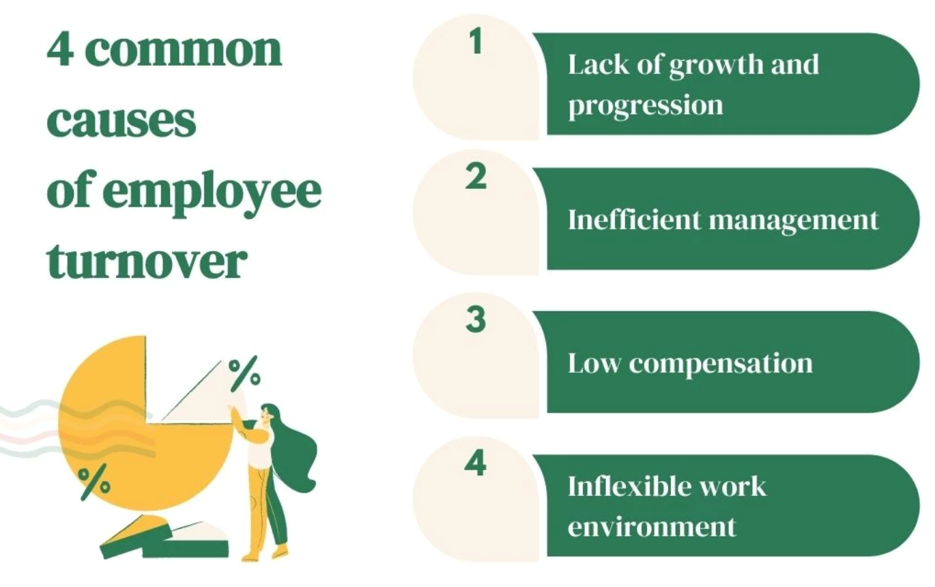
Imagine you’re part of a band. Organizational commitment is like being fully invested in the band’s success. You’re not just in it for the tunes; you really care about putting on a great show for the audience.
When employees feel emotionally attached to their organization and its goals, this is referred to as organizational commitment. It is a crucial aspect that can impact employee retention, job satisfaction, and productivity.
How can organizations work towards constantly improving themselves? Let’s find out!
What is Organizational Commitment?
The feeling of responsibility and loyalty towards an organization is known as organizational commitment. This results in employees being motivated to work towards its success. It is a psychological state in which employees identify with and feel involved in their organization’s goals and values.
This commitment fuels that fire within you. Making work feel less like a job and more like a purposeful journey with teammates you genuinely cherish.
But it is also a predictor of employee turnover and absenteeism. We’ll talk further about it in this blog.

Types of Organizational Commitment
There are three types of organizational commitment:
Affective Commitment
The term “affective commitment” describes the emotional investment that individual has in their workplace. Employees with high emotional commitment have a strong emotional connection with their organization. They stay loyal.
ALSO READ: The Power of Culture Assessment in Shaping Organizational PolicyContinuance Commitment
Continuance commitment refers to an employee’s perceived cost of leaving the organization. For example, employees who are committed to their job due to time, effort, and potential losses are less likely to leave the organization.
Normative Commitment
The term “normative commitment” describes an employee’s feelings of duty to remain with the company.
Long-term employees often feel loyalty and enjoyment from the perks of personal and professional growth. Further improving their motivation to stay with the organization.
Importance of Organizational Commitment
The importance of organizational commitment is applicable to both employees and organizations. Here are some reasons why:
Employee Retention
Keeping employees happy and engaged is like holding onto cherished friends. It fosters loyalty, reduces turnover, and ensures a thriving workplace. Such employees are less likely to leave the organization voluntarily.
Job Satisfaction
When employees are dedicated to their work, they’re happier in their roles. Employees with high commitment levels are more satisfied with their jobs and are less likely to experience job stress or burnout.
Productivity
When employees are deeply committed to their organization, they are driven to accomplish its goals. Most are willing to exceed their job expectations. This dedication fuels their motivation and fosters exceptional performance.
ALSO READ: Conducting Internal Analysis: A Step-By-Step GuideFactors Affecting Organizational Commitment
Several factors can affect employees’ organizational commitment:
Leadership
Leadership plays a crucial role in developing employees’ commitment. Leaders who are supportive, empowering, and provide clear direction can help employees feel connected to their organization.
Organizational Culture
A positive organizational culture influences the values of employees. This is done by recognizing their contributions and fostering a sense of belonging. Thus increasing employees’ commitment.
Work-Life Balance
When employees strike a balance between work and personal life, they tend to feel more dedicated to their company. Having time for personal interests boosts job satisfaction and fulfillment. Therefore fostering a stronger commitment to the organization.

Improving Organizational Commitment
Here are some ways organizations can improve their employees’ organizational commitment:
Communicate Clearly
Organizations should communicate their goals, values, and expectations to employees clearly and consistently. Employees feel connected when they understand what their organization stands for and what is expected of them.
ALSO READ: How Do Surveys and Feedback Help Maintain Company Culture?Provide Opportunities for Growth
It’s crucial to provide workers room to develop their skills and advance in their careers. Employees should feel that they are developing their skills and advancing in their careers.
Foster a Positive Work Environment
To reduce turnover, organizations must prioritize a positive work environment where employees are valued, supported, and appreciated for their contributions, fostering a sense of commitment and belonging.
Employee Turnover Vs. Employee Retention
Employee turnover and retention play a vital role in organizational commitment. Turnover is like saying goodbye to friends at a party, while retention is like building strong bonds that make people want to stay and contribute their best to the company’s success. Below, we have compared employee turnover and employee retention:
| Employee Turnover | Employee Retention |
| Lack of job satisfaction | Job satisfaction and fulfillment |
| Limited growth and advancement opportunities | Opportunities for growth and career development |
| Poor work-life balance | Support for work-life balance |
| Inadequate recognition and rewards | Recognition and rewards for achievements |
| Ineffective communication and leadership | Effective communication and strong leadership |
Overall, employee turnover causes employees to leave the company. On the other hand, in employee retention, the above factors help to retain employees and create a positive and engaging work environment.
Wrapping Up
In conclusion, organizational commitment is like a human in that it requires nurturing, trust, and communication to thrive. Just as humans need a sense of purpose and belonging to feel fulfilled, employees need a strong sense of commitment to their organization to feel engaged and motivated.
By fostering a culture of commitment, businesses can reap the rewards of a loyal and productive workforce.
FAQs
How can I measure organizational commitment?
Surveys, interviews, and assessments measure employees’ dedication, loyalty, and alignment with the company’s values and goals to gauge how committed employees are to an organization. These insights help companies identify and improve areas that need attention.
What if I don’t feel aligned with the company’s values or goals?
If the company doesn’t align with your values or goals, it might not be the right place for you. Find an environment that supports your growth and happiness.
What if I feel my organizational commitment is wavering?
If you find your organizational commitment wavering, it’s essential to reflect on the reasons behind it. Communicate your concerns with your supervisor, explore ways to re-engage with your work, and seek support or development opportunities that can reignite your commitment.

